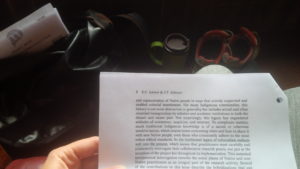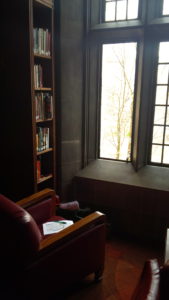Sitting by the window in the library one day, I overheard a sleeping man being woken and in hostile tones being asked to show his student or membership card. He couldn’t, and so was escorted out. At the time I was reading about power and oppression in the guise of colonialism.
 The overheard encounter made me think about where I was and who I am – or, maybe more importantly, who I am perceived to be. No one came over to me and asked to see my ID card. Mind you, I wasn’t sleeping. But why is sleeping in a warm place with comfortable couches such an act of transgression? This in turn made me think about place.
The overheard encounter made me think about where I was and who I am – or, maybe more importantly, who I am perceived to be. No one came over to me and asked to see my ID card. Mind you, I wasn’t sleeping. But why is sleeping in a warm place with comfortable couches such an act of transgression? This in turn made me think about place.
Much has been written about doing research “in the field” – about the spaces of research that are out there, in the real world. We read about community engagement, about forming research partnerships and drawing up research agreements and how to conduct yourself as ethically as possible. We read about researchers’ daily struggles with community-based research, whether “cross-cultural” or within one’s own culture. But what about the quiet spaces – the public, private, or policed spaces – that we occupy on a daily basis in preparation to meet the “real world”? I spend more time in my office and in libraries than I will ever spend “in the field.”
These are protected spaces, where I am sheltered from the people I do research with. Where I am encouraged to think, reflect, and engage in dialogue with other academics – exclusively. Where people without a membership card are asked none too politely to leave. What kind of impact does this have on the research that I do?
